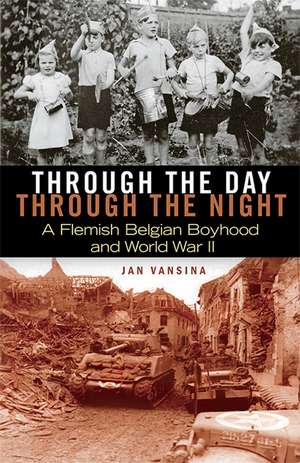Through the Day, through the Night: A Flemish Belgian Boyhood and World War II
Autor Jan Vansinaen Limba Engleză Paperback – 19 mai 2014
One of twelve children in a close-knit, affluent Catholic Belgian family, Jan Vansina began life in a seemingly sheltered environment. But that cocoon was soon pierced by the escalating tensions and violence that gripped Europe in the 1930s and 1940s. In this book Vansina recalls his boyhood and youth in Antwerp, Bruges, and the Flemish countryside as the country was rocked by waves of economic depression, fascism, competing nationalisms, and the occupation of first Axis and then Allied forces.
Within the vast literature on World War II, a much smaller body of work treats the everyday experiences of civilians, particularly in smaller countries drawn into the conflict. Recalling the war in Belgium from a child’s-eye perspective, Vansina describes pangs of hunger so great as to make him crave the bitter taste of cod-liver oil. He vividly remembers the shock of seeing severely wounded men on the grounds of a field hospital, the dangers of crossing fields and swimming in ponds strafed by planes, and his family’s interactions with occupying and escaping soldiers from both sides. After the war he recalls emerging numb from the cinema where he first saw the footage of the Nazi death camps, and he describes a new phase of unrest marked by looting, vigilante justice, and the country’s efforts at reunification.
Vansina, a historian and anthropologist best known for his insights into oral tradition and social memory, draws on his own memories and those of his siblings to reconstruct daily life in Belgium during a tumultuous era.
Best Special Interest Books, selected by the American Association of School Librarians
Best Books for General Audiences, selected by the Public Library Reviewers
Within the vast literature on World War II, a much smaller body of work treats the everyday experiences of civilians, particularly in smaller countries drawn into the conflict. Recalling the war in Belgium from a child’s-eye perspective, Vansina describes pangs of hunger so great as to make him crave the bitter taste of cod-liver oil. He vividly remembers the shock of seeing severely wounded men on the grounds of a field hospital, the dangers of crossing fields and swimming in ponds strafed by planes, and his family’s interactions with occupying and escaping soldiers from both sides. After the war he recalls emerging numb from the cinema where he first saw the footage of the Nazi death camps, and he describes a new phase of unrest marked by looting, vigilante justice, and the country’s efforts at reunification.
Vansina, a historian and anthropologist best known for his insights into oral tradition and social memory, draws on his own memories and those of his siblings to reconstruct daily life in Belgium during a tumultuous era.
Best Special Interest Books, selected by the American Association of School Librarians
Best Books for General Audiences, selected by the Public Library Reviewers
Preț: 231.38 lei
Nou
Puncte Express: 347
Preț estimativ în valută:
44.28€ • 46.34$ • 36.85£
44.28€ • 46.34$ • 36.85£
Carte tipărită la comandă
Livrare economică 31 martie-14 aprilie
Preluare comenzi: 021 569.72.76
Specificații
ISBN-13: 9780299299941
ISBN-10: 0299299945
Pagini: 264
Ilustrații: 38 b-w photos, 2 maps, 2 tables
Dimensiuni: 140 x 210 x 18 mm
Greutate: 0.27 kg
Ediția:1
Editura: University of Wisconsin Press
Colecția University of Wisconsin Press
ISBN-10: 0299299945
Pagini: 264
Ilustrații: 38 b-w photos, 2 maps, 2 tables
Dimensiuni: 140 x 210 x 18 mm
Greutate: 0.27 kg
Ediția:1
Editura: University of Wisconsin Press
Colecția University of Wisconsin Press
Recenzii
“Through the Day, through the Night is more than a memoir. Jan Vansina has brought to the story of his boyhood and young adulthood the gifts of a historian and ethnographer, steeped in oral history. He highlights and illumines the culture of Belgium—his country of origin—and the culture of the upper class, Flemish, Catholic, intellectual and artistic family in which he was raised. And he vividly conveys his coming-of-age experiences during World War II when Belgium was invaded and occupied by German forces.”—Renée Fox, the Annenberg Professor Emerita of the Social Sciences, University of Pennsylvania
“A captivating read. Not only a personal narration about the Flemish struggle to achieve cultural and political recognition, but also a lesson on how history and memory work.”—Bogumil Jewsiewicki, Université Laval, Canada
“[This] memoir is set against the backdrop of not only the increasing prewar radicalization of Belgian politics but also the Flemish-Walloon cultural and linguistic divide and its effects on [Jan Vansina’s] life. He depicts his experiences within the context of Antwerp and the surrounding villages and towns in which he moved around during the war, blending them into a seamless narrative.”—H-Net
Notă biografică
Jan Vansina is professor emeritus of African history at the University of Wisconsin–Madison. His many books include his memoir Living with Africa and the landmark Oral Tradition as History.
Cuprins
Preface
Acknowledgments
A Note on Spelling Conventions
1 First Discoveries: 1933 to 1939
2 A Carefree Beginning: 1933 to 1939
3 War Erupts: July 1939 to 1940
4 Hungry Years: July 1940 to Summer 1942
5 Ominous Horizons: July 1942 to September 1944
6 Unravelings and Outcomes: September 1944 to September 1945
7 In Search of a Vocation: October 1945–July 1951
Epilogue
Suggestions for Further Reading
Index
Acknowledgments
A Note on Spelling Conventions
1 First Discoveries: 1933 to 1939
2 A Carefree Beginning: 1933 to 1939
3 War Erupts: July 1939 to 1940
4 Hungry Years: July 1940 to Summer 1942
5 Ominous Horizons: July 1942 to September 1944
6 Unravelings and Outcomes: September 1944 to September 1945
7 In Search of a Vocation: October 1945–July 1951
Epilogue
Suggestions for Further Reading
Index
Descriere
Vansina, a historian and anthropologist best known for his insights into oral tradition and social memory, draws on his own memories and those of his siblings to reconstruct daily life in Belgium during World War II.
